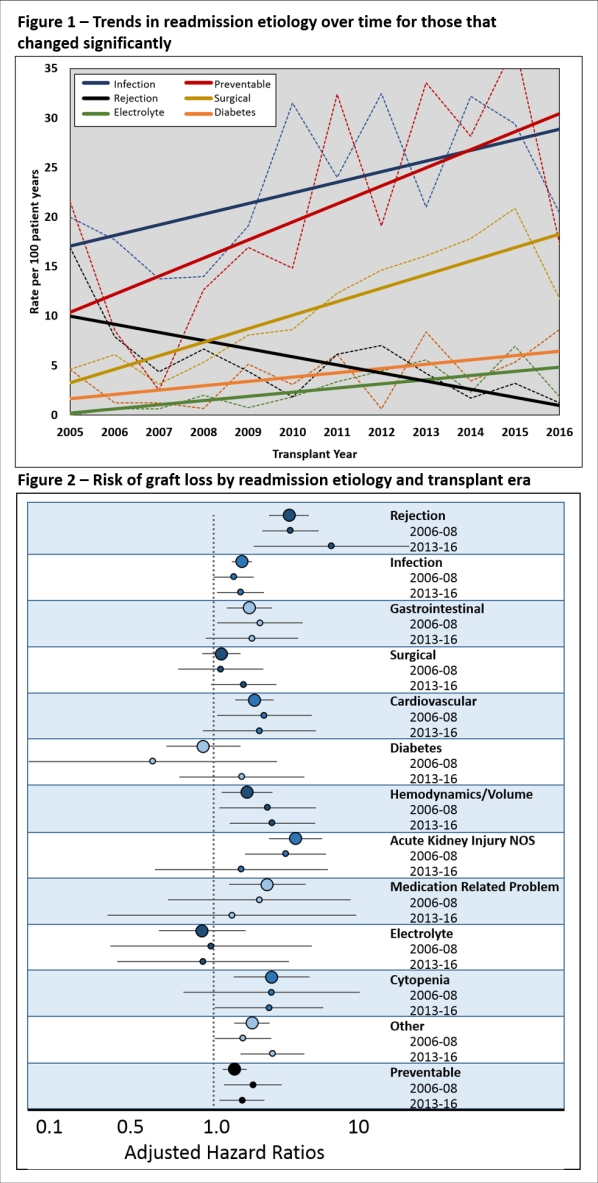Evolving Etiologies for Readmissions and Their Impact on Graft Survival in Kidney Transplantation
D. Taber, N. Pilch, Z. Su, C. Mardis, J. Fleming, N. Patel, H. Meadows, P. Mauldin, V. Rao, D. Dubay.
MUSC, Charleston, SC.
Meeting: 2018 American Transplant Congress
Abstract number: 138
Keywords: Graft failure, Kidney transplantation, Multivariate analysis
Session Information
Session Name: Concurrent Session: Kidney: Cardiovascular and Metabolic - 1
Session Type: Concurrent Session
Date: Sunday, June 3, 2018
Session Time: 4:30pm-6:00pm
 Presentation Time: 4:30pm-4:42pm
Presentation Time: 4:30pm-4:42pm
Location: Room 303
Background: Although readmissions after kidney transplant are a well-known risk factor for graft loss, it is unclear if certain etiologies are associated with poorer outcomes and whether these have changed over time.
Methods: Longitudinal cohort study of adult KTX transplanted between 2005-16 followed through 2017. Readmissions within 1-yr of transplant were abstracted from medical records and assigned to one of 12 primary etiologies based on discharge diagnoses (rejection, infection, GI, surgical, CV, diabetes, hemodynamics/volume, AKI, ADE, electrolyte, cytopenia and other). Preventability was assessed using modified AHRQ criteria. Rates were estimated in 100 patient-years (100 pt-yrs) and multivariable generalized linear modeling was used to assess adjusted trends in rates over time; Cox regression was used to assess the adjusted impact of readmission etiology on graft survival.
Results: 1,840 KTX were included, encompassing 12-years of transplants and 1,485 readmissions during the 13 years of follow-up (80.7 per 100 pt-yrs). Infections (23.0 per 100 pt-yrs), surgical complications (10.8 per 100 pt-yrs), GI (6.6 per 100 pt-yrs) and rejection (5.5 per 100 pt-yrs) were the most common etiologies. Over time, rates for infections, surgical complications, diabetes, electrolytes and preventable readmissions all significantly increased (p<0.05), while rejection readmission rates substantially decreased (p<0.01, Figure 1). There was considerable heterogeneity in the readmission etiology and the impact on graft loss; this also changed over time (Figure 2). Readmissions rates for infections, surgical complications, diabetes, hemodynamics/volume have all increased over time while also having a growing risk impact on graft survival in more recent years.
Conclusion: Readmissions after KTX are strongly associated with graft loss; however, this association significantly differs by etiology and has changed over time. Historically, rejection, GI and CV etiologies were major risks. Recently, infections, surgical complications, diabetes, and hemodynamics/volume etiologies are rising and a growing risk for graft loss.
CITATION INFORMATION: Taber D., Pilch N., Su Z., Mardis C., Fleming J., Patel N., Meadows H., Mauldin P., Rao V., Dubay D. Evolving Etiologies for Readmissions and Their Impact on Graft Survival in Kidney Transplantation Am J Transplant. 2017;17 (suppl 3).
To cite this abstract in AMA style:
Taber D, Pilch N, Su Z, Mardis C, Fleming J, Patel N, Meadows H, Mauldin P, Rao V, Dubay D. Evolving Etiologies for Readmissions and Their Impact on Graft Survival in Kidney Transplantation [abstract]. https://atcmeetingabstracts.com/abstract/evolving-etiologies-for-readmissions-and-their-impact-on-graft-survival-in-kidney-transplantation/. Accessed July 3, 2025.« Back to 2018 American Transplant Congress

